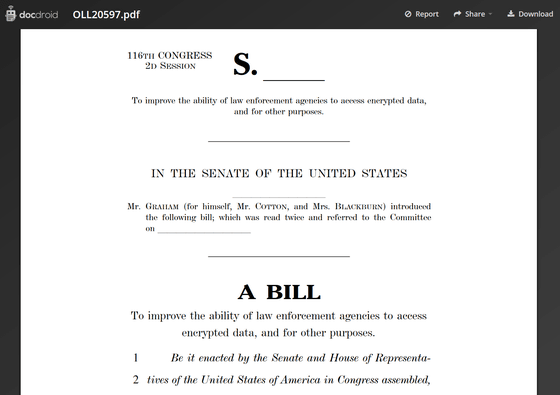A bill that compels companies to 'decrypt' is submitted

Local time June 23, 2020, three Republican senators are billing a law called 'Lawful Access to Encrypted Data Act (LAED) to prevent encryption that cannot be canceled even with a search warrant. Lawful Access Law)”. If the bill passes, technology companies will need to assist law enforcement agencies in decrypting encrypted data.
OLL20597.pdf | DocDroid
https://www.docdroid.net/IHiIrMA/oll20597-pdf

Graham, Cotton, Blackburn Introduce Balanced Solution to Bolster National Security, End Use of Warrant-Proof Encryption that Shields Criminal Activity | United States Senate Committee on the Judiciary
https://www.judiciary.senate.gov/press/rep/releases/graham-cotton-blackburn-introduce-balanced-solution-to-bolster-national-security-end-use-of-warrant-proof-encryption- that-shields-criminal-activity
There's Now an Even Worse Anti-Encryption Bill Than EARN IT. That Doesn't Make the EARN IT Bill OK. | Center for Internet and Society
https://cyberlaw.stanford.edu/blog/2020/06/there%E2%80%99s-now-even-worse-anti-encryption-bill-earn-it-doesn%E2%80%99t-make- earn-it-bill-ok
The Senate's New Anti-Encryption Bill Is Even Worse Than EARN IT, and That's Saying Something | Electronic Frontier Foundation
https://www.eff.org/deeplinks/2020/06/senates-new-anti-encryption-bill-even-worse-earn-it-and-thats-saying-something
The bill was submitted by Senator Lindsey Gram, Senator Tom Cotton and Senator Marcia Blackburn , who are chairs of the Senate Judiciary Committee. The bill requires device manufacturers and service providers to access encrypted data and assist law enforcement agencies if warrants are obtained by law enforcement agencies. Target devices are any device with storage of 1GB or more, and services include OS, messages, chat, social media, email, cloud storage, video conferencing and all other applications.
When LAED is enforced, technically unbreakable encryption is prohibited and technology companies are obliged to create backdoors in device services for law enforcement agencies. For example, depending on the warrant, Apple would have to unlock the iPhone and Facebook would have to decrypt WhatsApp messages.
Historically, law enforcement and technology companies have been at odds with each other when dealing with encrypted data. Devices such as smartphones are also used in various crimes, and they may contain large amounts of evidence data. However, in order to retrieve the data stored inside, it is necessary to break the encryption applied to the system of the smartphone. Law enforcement agencies are demanding the removal of this encryption, one example of which is that Apple has issued a government order to ``create a back door that can bypass the encryption of the iPhone'', but Apple refused I will.
Apple rejects government request to ``create a backdoor that can bypass iPhone encryption''-GIGAZINE

By Erickson Alves
Security is the reason device manufacturers and service providers refuse to create backdoors for government agencies. In the case of Apple's refusal of the government request, Apple said that it is cooperating with law enforcement agencies as much as possible, but Apple also made it impossible to decrypt , ``Backdoor is It could leave all devices vulnerable, jeopardizing national security and the data security of our customers. There is no 'just-behind backdoor'.'
Senator Gram said the LAED law was submitted this time: 'Terrorists and criminals, regardless of their smartphones, apps, or other means, routinely use technology to coordinate and communicate their activities. Despite the court order, there were numerous terrorist and serious criminal cases that prevented law enforcement agencies from accessing critical information.Unfortunately, technology companies respect court orders and Refusing to support the investigation, my position is clear: law enforcement should be able to obtain the information needed for an investigation after obtaining a court warrant. It respects and protects the privacy rights of law-abiding Americans, but it does not allow terrorists and criminals to hide behind technology to hide their tracks.' Explaining.
For the LAED law, experts such as the Electronic Frontier Foundation , a technology privacy group, and Matthew Green , a cryptographer at Johns Hopkins University Information Security Laboratory, are at greater risk than usefulness. Is issuing a warning.
You should really just read Riana's piece on the new crypto bill. But there are two parts of it I specifically want to call out. 1/ https://t.co/ePIGpVdCJO
— Matthew Green (@matthew_d_green) June 25, 2020
Related Posts:
in Security, Posted by darkhorse_log







